Ep. 14 - Exit Planning Excellence With Guest Scott Snider
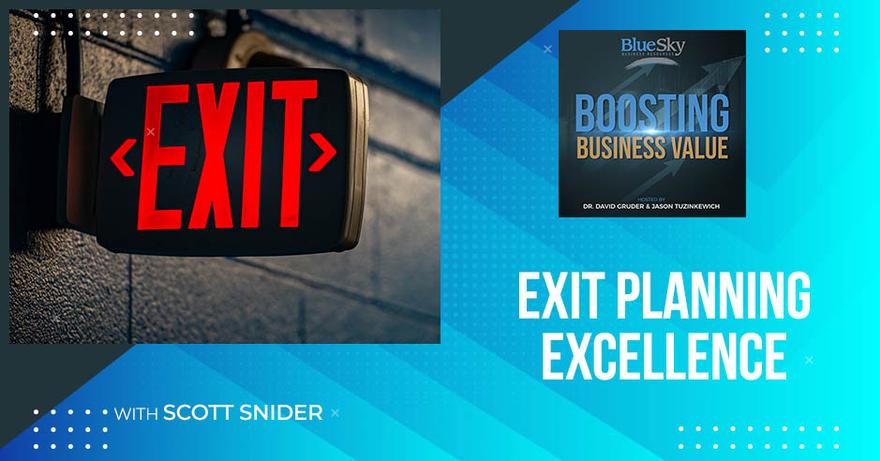
Do you know the top two reasons why so many business owners get in the way of successfully selling their business? Number one: They have made the business too dependent on them because they have not exited out of tactical planning and implementation. Number two: They've been so focused for so long on building their business that they've neglected building themselves. The result? Most owners have no idea what to do with their life after selling their business. In this eye-opening BBV episode, we interview Exit Planning Institute President, Scott Snider, on value acceleration and on the "5-4-3-2-1" of exit planning.
---
Watch the episode here
Listen to the podcast here
Exit Planning Excellence With Guest Scott Snider
Business Value Acceleration And The "5-4-3-2-1" Of Exit Planning
In this episode, we're going to be talking about highlighting the CEPA certification or the Certified Exit Planning Advisory certification, the Exit Planning Summit, and the Exit is Now podcast. We are very excited to have a special guest, Scott Snider, with us. David, why don't you kick us off, please?
This is going to be an episode very much worth reading all the way through as though our other episodes aren't. For those of you who are new to this show, I'm Dr. David Gruder, the business life cycle, exit planning, and post-acquisition psychologist for Blue Sky Business Resources. With me is co-host Jason Tuzinkewich, Blue Sky's Chief Operating Officer and all-around fix-it guy and systems guy. Jason, go ahead and introduce our wonderful guest for this episode, Scott Snider.
We have Scott with us. He's the President of the Exit Planning Institute. When I got my CEPA, he was one of my teachers. He and the rest of the team gave me a great education and a great foundation for the work that we do at Blue Sky with exit planning. We thought it would be helpful for all of you to get to know Scott, learn a little bit more about what he and his organization do, and gain a better understanding of the depth and the nuance that goes into real exit planning and successful transitions for business owners and their businesses. Scott, tell us a little bit about yourself.
Thanks for having me on. Maybe you could all read the formal bio on the websites and follow us on LinkedIn and all that good stuff. Rather, let's talk about why we're passionate about what we do in the business owner and exit planning space. For me, here's a little bit of an interesting story. I'm a lifelong entrepreneur. I started my first business at the seat in my geometry class when I was sixteen in high school. I had flourished and become something real. I was able to sell that company by the age of 24 as my first exit. If you can remember when you were 24 even though you're out of college and everything, what do you know? You're still starting your adult life.
It was my first big exit planning lesson. That lesson comes from a personal standpoint. Jason, if you remember, one of the things that make CEPA different is we believe in a holistic plan and the alignment or the blend of business, personal, and financial goals or elements. Although a 24-year-old guy had a pretty sound financial plan and a successful business exit, what I found myself doing at 24 is wandering the Earth and trying to figure out who I was because since I was 16, I was this entrepreneur that owned a landscape construction company and that went to school for horticulture. I was all in. At 24, I find myself saying, "I let my business define who I was."
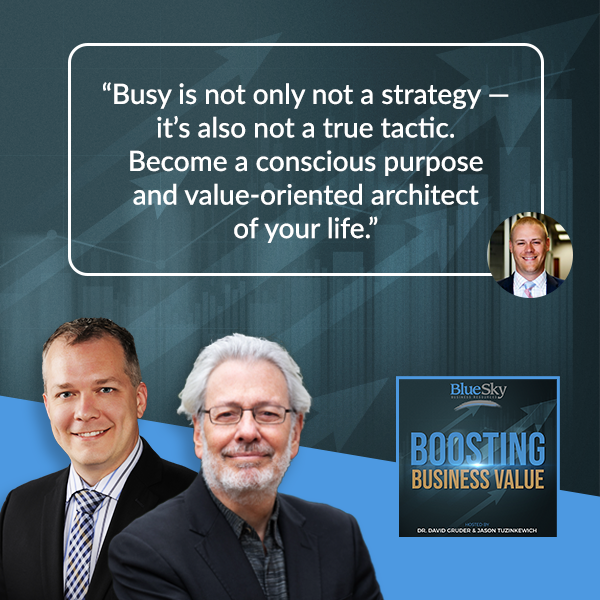
Saying all of that, what's interesting is that my dad was and is a Certified Exit Planning Advisor. I always bust his chops a little bit because I was like, "Dad, where were you when it came to personal planning as a CEPA?" It was quite an interesting journey after that. As I wandered, I fell in love with understanding different business owners' companies while helping my dad and his business partner, Andy, at the time, build their consulting practice as Certified Exit Planning Advisors. What we quickly realized is that if you rewind, the exit planning space was very conceptual.
That EPI of old taught a lot of great philosophies and concepts. Frankly, people like Jason were sitting there and saying, "How do I go out and implement this now that I've learned it?" Jason came through a program where now we have the Value Acceleration Methodology, something that my dad created that we saw back in this consulting company. I challenged my dad to flip the script. I said, "As an exited owner myself, what was lacking was a holistic-minded team of advisors that represented all of the owners and who they were as a person, business owners, managers, visionaries from a personal and financial strategy, and somebody that doesn't have a business. It's a holistic approach."
In 2012, we buy the Exit Planning Institute and implement the Value Acceleration Methodology, and here we are now. We have an interesting family business between me and my dad. Dad has this interesting mix that you saw at the CEPA program where he came out of Big Corporate down to the lower middle market and down to a small family business before he started his consulting firm. That's mixed with being an entrepreneur as well and then mixed with my perhaps stereotypical entrepreneur.
As we talk, you will probably see me wander out to the side here because you are giving me ideas. It has been a great ride. Honestly, I couldn't be prouder of what folks like Jason are doing in our marketplace, helping owners understand that although they have something successful, that doesn't mean that they have something of significance or something that's transferable, ready, valuable, and aligned to their business, personal, and financial goals.
I could get down a whole rabbit hole here, but I could tell you that I'm passionate about the work that we do, both short-term with the Baby Boomers more immediately exiting and more long-term with the next generation of owners or people in their 30s, 40s, and 50s. If we're doing our job right as Certified Exit Planning Advisors, we could teach owners a whole new way to have a blended and balanced life and have an awesome company as well. That's what we're passionate about here.
I love what you're saying about a holistic integrated approach to exit planning and how you drew a distinction between success and significance. It's possible to have both, yet as all three of us know, and as a lot of our audiences know, there are many entrepreneurs who have been successful and struggle with their success not having felt like it added significance to their lives. There are other entrepreneurs who are struggling financially in terms of success even though what they're doing feels like it has significance for them. I appreciate you bringing up the distinction between success and significance. We can do a deeper dive into that because my first question to you is about unpacking the 5-4-3-2-1 of exit planning that you talk about.
We always get this question. It's quite interesting. If you had me and my dad side by side, my dad would always say, "Value Acceleration Methodology is simple." I always say, "Dad, it's simple once you know it, and once you have a guy like Jason teaching you it and coming into your life as an owner." These 90-day sprints and this concept of balance are the stuff that we all hear. What's hard about it is unlearning what you've learned as a business owner. To make this methodology less complex, we came up with this 5-4-3-2-1. In the simplest form, it's probably identified as that.
When you think about what it means to exit a company and have high value but also have a balanced personal and financial life, it comes down to these five things. One, there are the five stages of value maturity. You can think about that as a simple staircase. The ultimate goal for any owner is the top of the staircase. At the top of the staircase is Manage Value. It is our life's work. We have harvested it. We have it. We give it to a financial advisor to manage.
We're buying new businesses. We're investing in the market. We're paying for our sons' and daughters' weddings or whatever that might be for you. We're managing that value, but to get to that ultimate goal, you have to start way at the bottom and identify what you have to even get up there. You have to identify this roadmap or strategy to get to harvest. Everything in between is we have to protect the value and build value. We eventually harvest value. That's the five.

The four is where most business owners are most interested because it's where we spend as owners most of our time. The four are the four intangible capitals. It's customer capital, social capital, human capital, and structural capital. These four intangible capitals drive nearly 80% of a company's value. If you think about these four Cs, intuitively and naturally this is how owners operate their companies, especially if you get in the small markets. Owners are coming into their warehouses, storefronts, offices, or whatever it might be.
They care about their customer. They want more profitable revenue. They're likely the heartbeat perhaps of their cultures. They want to retain and grow great people. They want them to operate in a very efficient way. It's structural capital. When you start to talk about these four Cs, these are the natural things that owners do every day, but for guys like us, what we're advising owners to do is make them more intentional and very deliberate to create this company of more significance.
We could debate that it's 3 by 3 or 3 by 2. The big three that we need to know for our audience in a valuation sense is there are three gaps that any owner has. I don't care if you're 20 years old starting or 70 years old more immediately trying to harvest and move into the next phase of life. You have three gaps. You have a wealth gap, a profit gap, and a value gap. This is critical to understand for many business owners because many owners think that exit planning starts with the business because it's our largest asset. It's where all the value is, but for me, exit planning starts with a wealth gap conversation because we need to understand who we are outside of the business and where we want to go.
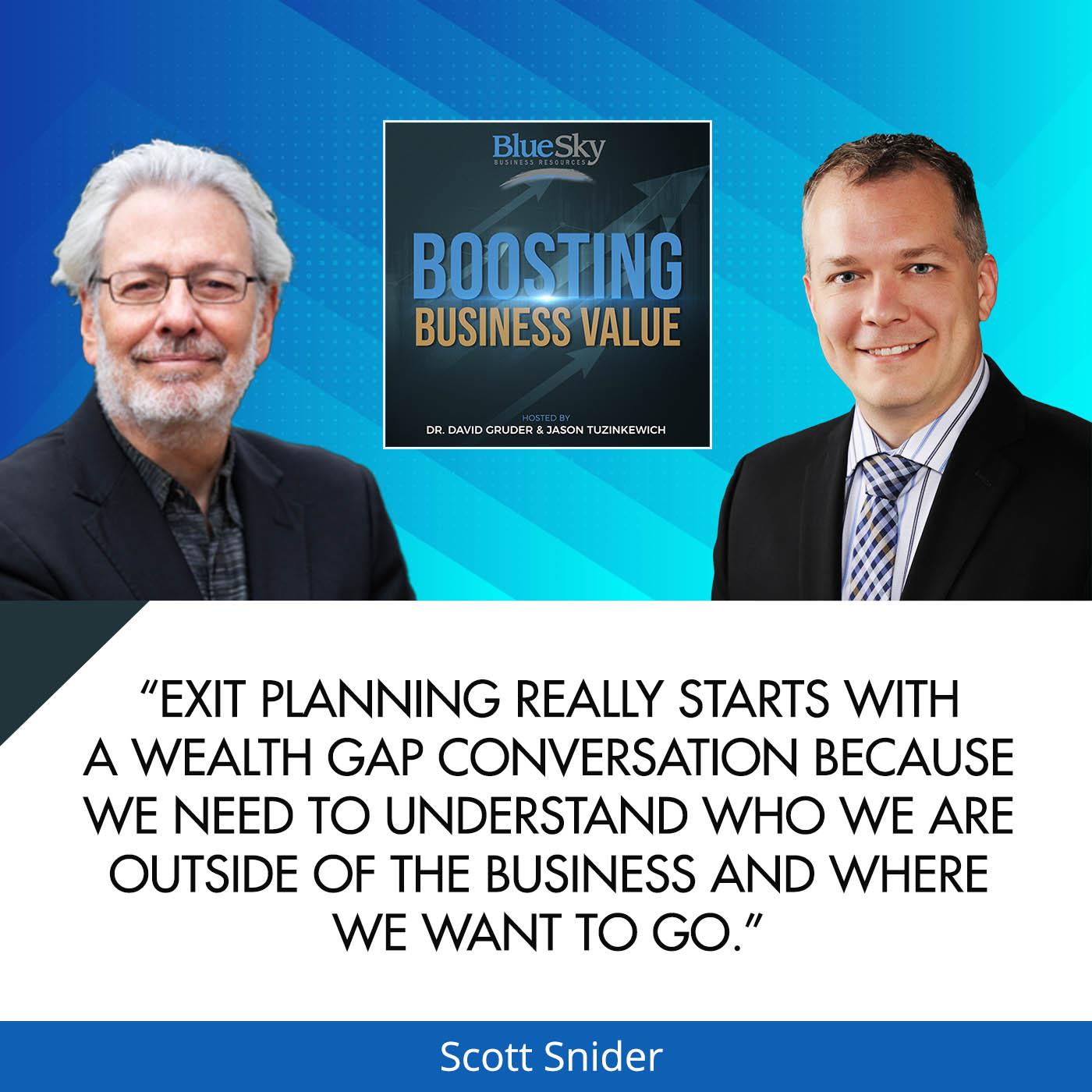
Before we came on the show, we were talking about how I live in a small century home on the West side of Cleveland. It's a little farm town or train town thing. I like that lifestyle. I got the motorcoach and the RV. I and my family do that. That's pretty much good enough for us. We like traveling and experiences, but if you look at my dad's book, Walking to Destiny, he studies this company that he calls the perfect exit. That guy's name is Andy Rayburn. Andy sold his business. His dream was to own a Minor League baseball team. That guy needs a hell of a lot more money than I do in my next phase of life. It's not bad or good. It is whatever you're passionate about.
When you think about this wealth gap, maybe Andy's wealth gap is going to be a lot bigger than my wealth gap regardless if both of us have them. It becomes, "How do I fill that wealth gap?" That wealth gap is filled by the business value and my largest asset. The question becomes, "What is my business worth? Is it worth the gap?" We get to the profit gap and the value gap. The three for any owner to know is the three gaps. The next is also critical. It's the two concurrent paths. I describe it as this. Time and time again as an owner myself, I hear advisors tell me, "You need to be more visionary and more strategic. You need to stop working in the business. You need to start working on the business."
What we don't hear a lot, and maybe because it's silly or corny to say, is, "You have to stop living in your life and work on your life." Every owner has two concurrent paths. They have a personal path that embraces their personal and financial stuff and a business path that is their business. The last one is value. The number one goal in the 5-4-3-2-1 is value. It's not just business value, but it's driving value across all three elements. The three legs of the stool are business, personal, and financial goals. If you hear me talk about that for any audience that is a business owner, that resonates. It makes a more complex methodology and process a little bit simpler, I hope, for us to understand.
I like it. That 5-4-3-2-1 sequence is easy to remember. Once you have that mnemonic device to help you remember, then it becomes easier to go back and fill in the blanks. I love that. One of the things that you've brought up a couple of times that I want to highlight because it's brilliant is the idea of a balanced business giving you the freedom for a lifestyle. We have this cliché about lifestyle businesses, but what a lifestyle business is in the current nomenclature is a business that you're working in. You're getting enough money to provide for your lifestyle, and you're not growing at all.
Those are not valuable businesses but a business that provides you with a lifestyle. It not only allows you the quality of life and the cashflow you need now, but it's growing. It's perpetual and durable. It also has value. I like the idea of changing the nomenclature from a lifestyle business to a balanced business that allows you a lifestyle. That's something that leads well into this Value Acceleration Methodology that you've talked about. How do you go from a lifestyle business to a business that has value?
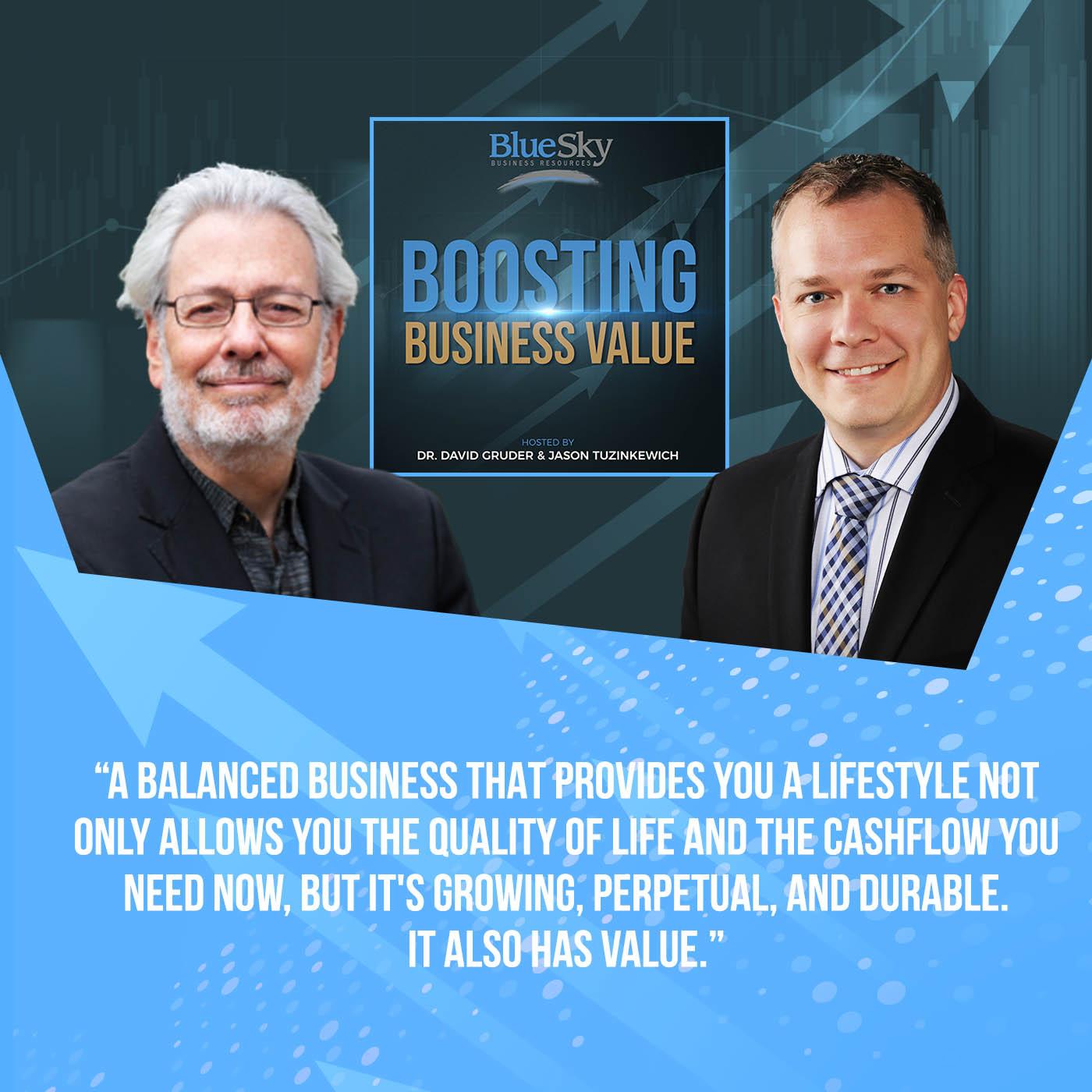
You take that 5-4-3-2-1 where David started our conversation. It's these conceptual things. If you're sitting here, and you bought into the 5-4-3-2-1, your next logical question has to be, "How the hell do I implement that? That all sounds good, but how do I make it happen?" You make it happen through the Value Acceleration Methodology, which is a process and approach to making these things come alive. Jason, to your point about lifestyle versus a value creation business, the difference is simple.
We have a decentralized business owner. I don't have to show up every single day to my business because it relies on me from a strategic and visionary standpoint. It relies on me from an operational and fulfillment standpoint. The most valuable businesses are the ones that are decentralized from the owner. If you get all the way up to this ultimate goal as an owner, a lot of us want to roll up our sleeves and do the trade, the service, the vision, or the invention that we had, but a lot of business owners are mentors, coaches, and visionaries. They don't want to be tied down to the fulfillment of a product. They want to be open every day to say, "I could pivot over here and do this show."
The most valuable businesses are the ones that are decentralized from the owner.
Before I jumped on the show, I was having lunch with a couple of the people here at EPI that I haven't got to hang out with in a long time and needed some support in the morning. I was working with some of the VIP people at the Exit Planning Summit that are coming to immerse themselves in this experience. We have decentralized our business at EPI.
First, we have decentralized it away from Chris Snider, my dad, the creator of the methodology. In 2023 and the next three years, we're trying to decentralize it away from me. It's a lot easier said than done, but nonetheless, that's the key difference between this lifestyle company where I have to show up for the grind every day and this company that can run, operate, profit, and grow value without me around.
Better yet, the employees here at EPI aren't tied to Chris and Scott Snider. They're tied to guys like you. They're tied to providing for the Certified Exit Planning Advisor because they're tied to the overall mission. They're passionate about it. They're tied to each other as a team and a unit that's growing business. They're passionate about the core values. When you start to build this thing, it's much more than a lifestyle. It's a very purposeful approach.
That's beautiful. I love it.
I want to give you a quick second. We have been so honored and privileged to have you talk about EPI on our show, but tell us about the EPI podcast. Give us a quick pitch on that one.
I appreciate it. Our podcast is called Exit is Now. It's available on all podcast platforms. We're new to it though. A lot of people say I have a radio voice. It sounds pretty normal to me, but nonetheless, I did college radio. When I was in my first year of college, I got certified to be a radio DJ. I had a show called Good Morning Rock every Saturday from 8:00 to 12:00. My name there wasn't Scott Snider. It was The Duke. It was a nickname that my grandfather had in the Navy when he was there in World War II.
Nonetheless, I've always wanted to get back into radio. We started this podcast to frankly compliment other podcasts that are like yours and bring in what I would like to think is a very authentic look into my life as a business owner. When folks say, "I understand this Value Acceleration Methodology and this 5-4-3-2-1 stuff, but give me a case study and an example," I would like to think that at least our Certified Exit Planning Advisors can say, "Look to our owners. Look to Chris and Scott Snider. Not only do they have a business, but they have a family business. It adds another level of complexity perhaps."
The Exit is Now podcast, at least in the first year, is all about people, processes, approaches, and authors that have changed and shaped my life as a business owner and as somebody that frankly has known no other way than running a company other than Value Acceleration. I have the benefit of having a dad who created the methodology, but I wanted to showcase that in our podcast saying, "This is how it is done." It's not easy. It's not all beautiful. It's not perhaps even as clean as we're all talking about it on this show, but here's a real look at the challenges and the perks of running a company that's thriving to be a significant one, not just a successful one.
That's fantastic. It's a fun podcast. For those of you that are looking for more podcasts to put onto your rotation, I highly recommend it.
There are a couple of things that I want to unpack and pursue further. First of all, there's an interesting overlap between us. I also had a radio show in college.
Do you play music? Did you have a talk show? What kind of stuff did you do?
There were two. One was that I had a commentary. I did an editorial commentary thing. The other was that I hosted a classical music show on the radio station. You don't know, but part of my background is in music, performing, directing, conducting, and things like that, not just with classical but with jazz and Broadway shows.
Talk about things we need to unpack. Jason, you probably know more about this than me. We're going to have to have a whole other episode talking about this. I love that.
What I want to have you unpack a little bit further has to do with what creates wealth gaps. As a lead-off for that, what I see is that wealth gaps are created because business owners are so over-identified. Their sense of self is over-identified with the business that they haven't taken sufficient time to get clear about what their ideal calendar, lifestyle, and legacy significance is meant to be for them. Without understanding what their ideal calendar, lifestyle, and legacy is, they have no way of computing what type of wealth they need to generate to live their ideal calendar, lifestyle, and legacy. Do you want to riff on that?
You're spot on. First things first, many business owners don't even understand how much income they take out of their business. They live a pretty nice lifestyle. If they have a good business or even a large lower-middle-market business, they might not have to worry about income as much. They have a very steady and predictable company. They don't understand how much money is taken out of their business. Talk about lifestyle companies. Without the business, how do I survive?
In 2022, at our Exit Planning Summit, I did what's called a power session. It's like a TED Talk. I did it all around my journey toward finding personal purpose. What I found in my research, and I'm sure David, you could probably appreciate deep research, is that 72% of Americans said that they had no sense of meaning or purpose in their life. Think about that. No wonder owners don't plan personally. To your point, they identify with the business. That's who they are. That's who I was at 24.
When you leave it, you're like, "Who am I?" What I came to find is that I'm a family man. I'm an avid soccer fan and player. I like challenges, learning, traveling, and all this cool stuff, but when somebody identifies so much with their business, and then they go to sell it, it's a shock. It creates this wide gap. David, you probably appreciate this story. One of our Certified Exit Planning Advisors came through the program. He was a financial advisor. He goes, "I need you to talk to one of my clients. I got this client after he exited. He came into $30 million. He's struggling because he's lost his identity."
It's a funny story. I talked to him at 9:00 AM on a Monday. 10:00 AM for me is a big time at EPI. We have a company-wide big hour-long meeting. We talk about challenges. We award people for the cool stuff that they're doing. We talk through metrics and all the stuff. I'm always pretty jacked on a Monday morning. I talked to this guy at 9:00 AM. He says, "You're pretty amped up for a Monday morning." I told him the story I told you.
He's like, "Do you want to know what I'm doing?" I'm like, "What are you doing?" He's like, "I'm sitting in my basement, shooting pool, and playing billiards by myself in my boxer shorts. I'm 54. I'm divorced. I have two kids, but they're out of the house. I have nothing to do. My phone doesn't ring. My email box doesn't fill up. I have no sales calls. I have no operational needs. I don't know what's going on."
In the early phases, while that gentleman was frankly still a business owner, that gap is created because they have no idea what they want to do in the next act or phases of their life. This gentleman was 52 or 54 years old. He's got a long runway still. There's a lot of stuff this guy can do in life. Not only the psychological and more personal effects, but the financial aspects of that are huge. They have no idea because they never even thought about having a life without their baby around.
I've seen firsthand the devastating fallout of that starting in the late 1980s and early 1990s. Lots of people started coming to me for assistance who had attained more money than God or more power than God. They had accomplished that version or that distortion of the American Dream only to have discovered that their health was compromised, their spouse had left them, and their children weren't talking to them.
They would come to me saying, "What did I do wrong? I did all the right things, and now everything is in shambles." I get it. I want to underscore to our audiences that this is not an uncommon trap. Ideally, we prevent ourselves from falling into it if we can. Most of us because of cultural programming only discovered that we fell into the trap after we have paid a price for having fallen into the trap. It's never too late to get out of that trap.
The standing statistic is 87% of all transactions that fail are because the owner sabotaged them. When closing gets real, they recognize that they can't imagine living life after ownership. They find a way to destroy the deal. What I like about what we're talking about in this balanced business approach through doing all of this work early is that you get the opportunity as you decentralize yourself and separate your identity from the operation to start to practice life outside of work.
You get to try a few things while you still have the cushion of the business to back up your ego and all of those things so that you can start to find out, "What can I be excited about for the next several decades of my life?" That's something that I get very excited about whenever we talk about working with business owners to be proactive on the exit because 100% of business owners will exit their business standing up or laying down.
I don't know what you think about this. I also think there's a generational aspect to this. I always find it very fascinating to study different age groups. I'm on the cusp or the upper end of the Millennials or the lower end of the Gen Xers. My dad is a pure Baby Boomer. I have a lot of respect for Baby Boomers. They have an amazing ability to handle a crisis. They're very passionate individuals. They're driven by success, whether that's their business, their golf game, or their marriage. They want to find success in what they do. They're also the inventors of the 60-hour workweek. Thank you, Baby Boomers, for that.
We Millennials are probably saying, "We would like to do the 4-day work week versus the 5." It's the polar opposite in that sense, but nonetheless, there's a sense that you were raised that way at that time. They were raised by traditionalists. You're hardworking and passionate about your work. It will be interesting to see with the stuff that we know or this Value Acceleration stuff that we're talking about on this show how it takes to people in the next couple of generations.
You have the Gen Xers. I call it early 50s through your 40s. If you look at those generations, they are a generation of technology. They believe in working smarter, not harder. They value their time versus success. They value time as their number one. They already thrive or strive to have this blend or balance of work in their personal lives. It's everything that we have been talking about over the show. This exit planning or this Value Acceleration gives us that.
When you go into the Millennial generation, a couple of things stand out. They are a very ambitious generation but not framed. They are horrible financial planners. We are a generation that earns to spend. I was starting the show and talking about how I bought a motorcoach. There are people who are like, "What are you doing?" Nonetheless, it would be interesting to see in the next ten years this evolution of exit planning and how it's taking to people in their 40s, 50s, or 30s, and if their generational characteristics are true because if they are, the people in their 20s, 30s, 40s, and early 50s are much more attracted to what we're talking about now because they yearn for that. It's fascinating.
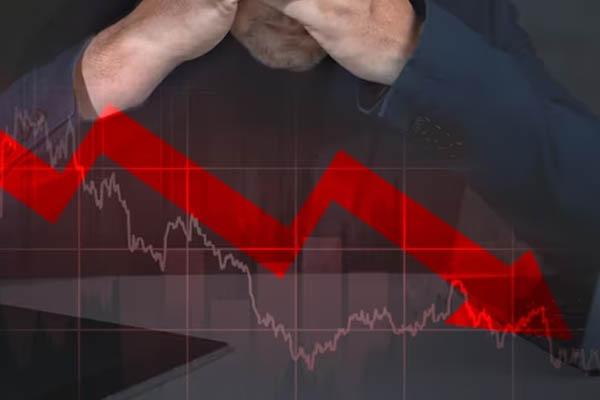
I'll add on that because as a Baby Boomer or someone who is part of that generation, I see a lot more increasing numbers of aging Baby Boomers finally waking up to what the younger generations never had to wake up to. They knew it from the get-go. My generation was the grinder generation, "You can only get wealthy through grinding it, working 120-hour weeks, and things like that." My generation is waking up in larger numbers to the idea that it was a faulty script, but I love the distinction that you're creating. There's value in delineating the generalities and trends among the generations.
There's even more value in turning that into temperaments because regardless of generation, there are grinder temperaments, indulgence temperaments, and integrated purpose lifestyle temperaments. The whole focus that you are bringing in this episode is, "Give up the grinder mentality and the indulgence mentality and step into an integrated purpose lifestyle approach to integrating your business and your life so that your business serves your life rather than you being a slave to the business."
That's well said by the doctor.
To bring this full circle, you started with the story of a young entrepreneur who exited at 24. If you look at the last few decades, we have had an explosion of young entrepreneurs and new startups more than we have seen probably since the Industrial Revolution in scale. We're going to see a lot of younger entrepreneurs exiting and needing a next phase that is more than retirement and that is different than a Baby Boomer's next act. Having these conversations and having this mentality already available, ready, practiced, and at their fingertips is going to be extremely powerful. It's going to elevate this wave of entrepreneurship to a level that personally I'm very excited about.
Before we move to takeaways, there's one other follow-up comment I would like to make. I want to then after that turn it over to you, Jason, whether you have a follow-up comment or question for Scott before we move into takeaways. My comment is an add-on to what you were saying, which is so spot on about the parallel to the old line, which has a lot of wisdom to it, "Work on your business instead of in your business." For sure. You drew a parallel to that having to do with, "Stop living in your life and start working on your life." I love that. Here's my add-on.
You may recall the first Indiana Jones movie, Raiders of the Lost Ark. There's this scene where all hell has broken loose. All of Indiana Jones' cronies and pals are huddled around him, panicked out of their minds saying to Indy, "What do we do, Indy?" Indiana Jones ultimately bursts out into this mock anger saying, "How should I know? I'm making it up as I go." That Indiana Jones approach to life is out of sequence. My take on, "Stop living in your life and start working on your life," is, "Become a conscious purpose and value-oriented architect of your life so you can then live an Indiana Jones approach to life."
It goes back to that purposeful living. It's so related to business because this is why owners sometimes don't even work on their business exit. It's because everything is going so well. They have a very successful company. They don't understand that success doesn't necessarily equate directly to significance, and just because you have a lot of income generation doesn't mean you have a lot of value creation. It's the same thing. It relates to their life. Their day-to-day life is pretty good.
Just because you have a lot of income generation doesn't mean you have a lot of value creation.
Not to get down a rabbit hole for us and me at EPI when we had to make this forced pandemic pivot in April 2020. It changed who I am as a person and who we are as a company because we were forced to look inside and say, "Who are we? What are we made of? What do we want to do?" Jason knows this from being in the community. In 2020, we were a company that did all of its programs in person.
Can you imagine? I had to cancel three programs in a row. In 45 days, we transitioned this business from in-person to virtual learning, and we did so in a way that was successful, but when you paused and looked back as we were about to cheer and pop the bottle of champagne like we have survived the pandemic, you could see everybody start to deflate.
They were deflated because the purpose, the core values, and the mission were all lacking a sense of camaraderie. That's another show for another time, but nonetheless, I would agree that there's this sense of this more intentional and deliberate way of living. I'm sensitive to it, David. We could talk about it all day, but I can tell you that it's a lot harder to figure out. Luckily, at 38 years old, I've been able to figure it out. It's always evolving. I can only imagine being a Baby Boomer, trying to investigate this at 65 or 70, and being like, "I've run my business for 35 years. Who am I?"
As a Baby Boomer, this is exactly what I've been helping people with for decades.
It's your work.
There's that old adage, "Busy is not a strategy," yet the world around us continues to keep us so busy. You need a moment of peace or a moment of stillness to start this reflective work. Mine was in the bowels of the engine room of a push boat on the Rhine River where even if there were people around, you couldn't converse because it was so darn loud. I was down there for years, developing an alternate fuel technology product for a couple of years. The isolation and stillness that comes out of it were when I had my transformative event.
Finding the ability to get a little bit of quiet in this storm of all the busyness is an important key to taking the first step. COVID did that for a lot of us. COVID brought the whole world to a stop and gave everybody a little bit of isolation. In some ways, the effects of that are going to be good. In other ways, there's a lot of damage that was done, too, but getting that piece or that moment of stillness within your business as well as your life is a very transformative thing.
Busy is not only not a strategy. It's not a true tactic.
Scott, what we like to do before we sign off is highlight a key takeaway. What are you taking from this conversation? What would you like to make sure that our audiences take away? If there's one thing they bring with them after reading this, what would it be for you?
We talked about so much good stuff. I'm going to wing it on the fly here for you. I would say the first thing that comes to mind. What we have talked about a lot is this balance and blend of three things. If I could take away anything as a business owner is that true exit planning and true significant companies are what we have been talking about. It's about this blend of business, personal, and financial. The value comes in the business, but value also comes in the personal and financial as well. It's understanding who you are, aligning a personal financial strategy to it, and then building a business that's highly valuable so that when you do harvest value, you can use it to manage a lifestyle or a lifetime to come.

I love that. Dr. G?
The takeaway for me is that I've not thought about the TBL of us in the corporate social responsibility world since 1999 or so when that finally started to catch on. There was the Triple Bottom Line of Profitability, which is People, Profit, and Planet. What you've illuminated quite beautifully is the TBL of you, meaning the TBL of each of us individually, which is that we drive our personal Triple Bottom Line value through integrating our business, personal, and financial goals.
That's the TBL of us. That's one of the big takeaways for me, and inside that, the importance of developing and implementing a decentralized business in which as the owners, we are the visionary strategists and innovators who can organically focus on what's most interesting to us because others in the business are focused on tactical planning and implementation.
I love it. The worst thing when you're in a group of great minds is being the last person to contribute.
Jason, it's a tough spot as the last guy to go here.
I'll do my very best. There's a drum that we beat in our community. You hear it a lot as a common thread through the show. You hear it in the EPI work that they do. It's a drum that we're almost beating among ourselves. I want to get this rhythm out into the larger world. As a business owner or entrepreneur, you are not doing anyone any favors by staying buried in solving the problems of the business every single day.
If you can start to remove yourself, mentor other people, and establish processes and systems within your business such that you are driving the vision and other people are dealing with the tactics, solving the problems, and doing the work, you get an opportunity to practice what your life outside of work feels like, what you like, what you don't, and what your purpose is. You get to build a business that has a durable and impactful value that can fund your life whenever you're ready to have a life after your business. You're caring for the staff within the business who all want to have the pride of contributing and building the great business that they decided to give their time to.
Sixty percent of their life is inside work. They have given that to the business owner. They want to be able to be contributors to it. Doing the work and this Value Acceleration Methodology and thinking about all these things with regard to your personal gaps is not selfish. That's the furthest thing from selfishness. It's caring for and trusting the entire ecosystem. I heard that come out throughout this dialogue. It's a point to drive home. I appreciate it, Scott.
Thank you. It has been great.
With that, Scott, we're so excited to have this time with you. It has been a real treat. We love what you and your team are doing. On behalf of Dr. Gruder and myself, thank you very much. We thank all of you out there for reading. Please click the subscribe button, add your comments, help us shape the future of these dialogues, and listen to the EPI podcast. With all of that said, thanks so much. We will see you next time.
Important Links
- Certified Exit Planning Advisory
- Exit Planning Summit
- Exit is Now
- Exit Planning Institute
- Value Acceleration Methodology
- 5-4-3-2-1
- Walking to Destiny
About Scott Snider
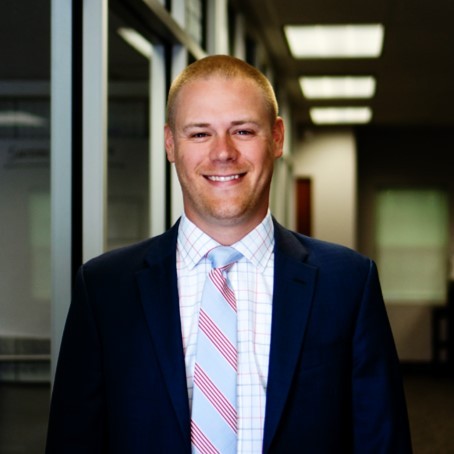
Scott Snider is a nationally recognized industry leader, growth specialist, and lifetime entrepreneur, who thrives on helping advisors learn how to educate clients, achieve market penetration and distinction, and deliver real results through rapid growth strategies. Scott is the President of the Exit Planning Institute (EPI), the Operating Partner of Snider Premier Growth, a small family investment company, and host of the "Exit is Now" podcast. At EPI, Scott is responsible for the strategic direction of the organization along with overseeing the company’s operations and chapter development. Since joining EPI, Scott has expanded the organization regionally, nationally, and globally, providing a transformational educational experience to advisors from all specialties across the globe.
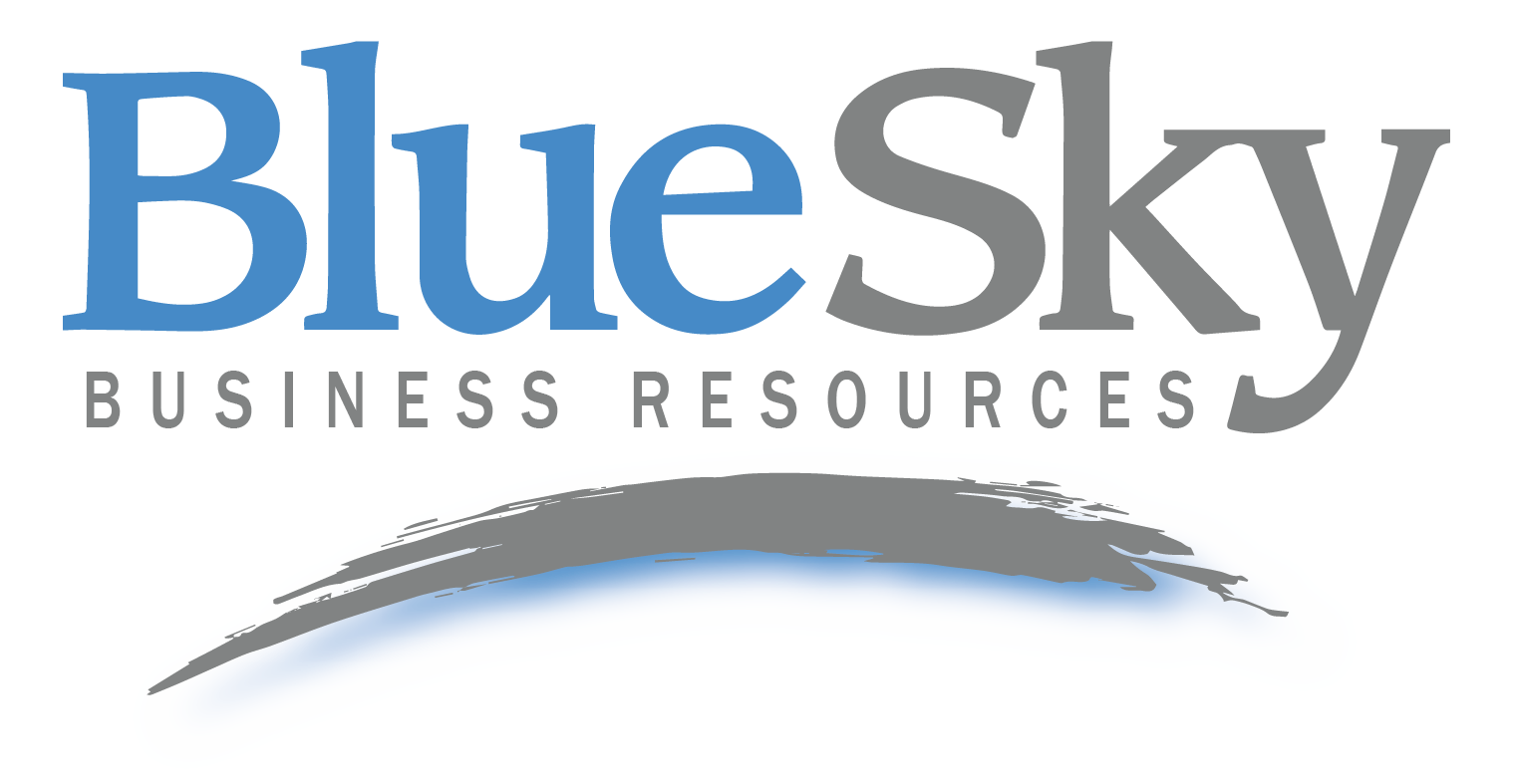

0 comments
Leave a comment
Please log in or register to post a comment